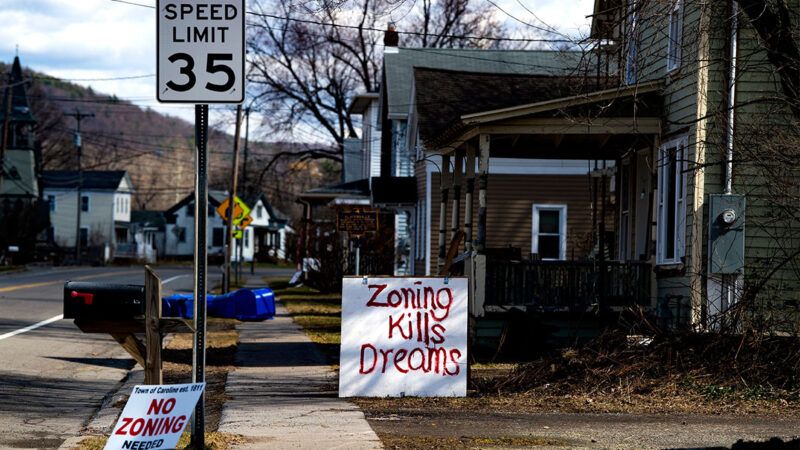'The Town Without Zoning' Elects a Pro-Zoning Town Government
Pro-zoning candidates in Caroline, New York, won the elections for town supervisor and three seats on the town board.

Following a contentious three-year fight, it appears that those supporting the imposition of a zoning code in the currently unzoned, rural, upstate community of Caroline, New York, have secured enough elected offices to get zoning done.
Incumbent pro-zoning Town Supervisor Mark Witmer, a Democrat, defeated anti-zoning challenger Tonya VanCamp, running on the independent Connecting Caroline ticket, with 53 percent of the vote.
Pro-zoning incumbent Democrats Kate Kelley-Mackenzie, Tim Murray, and Michele Brown also won their races for the three town board seats for which elections were held, defeating anti-zoning candidates Meghan Slatoff-Burke, Kathryn Mix, and small business owner Shari Conover. Anti-zoning incumbent town board member Carl Snow was not up for reelection.
As Reason covered in a lengthy story back in March, Caroline's fight over whether to adopt a zoning code began in early 2020, when the town board adopted a building moratorium in response to a proposed Dollar General development.
The moratorium successfully killed the Dollar General project. It also kicked off an intense debate about what would come next.
Slow-growth residents of the town (many of whom are current or retired faculty and staff from nearby Cornell University) argued that a comprehensive zoning code was necessary to stop future suburban sprawl from taking over the town.
On the other side were many of Caroline's business owners and farmers, who liked the freedom afforded by the town's lack of zoning and saw the proposed code as a threat to their ability to make productive use of their land.
"People are going to lose their freedoms on their properties," anti-zoning wedding venue owner John Morse told Reason earlier this year.
Since 2021, the town government dominated by pro-zoning members has been at work producing a draft zoning code littered with restrictions on residential construction and commercial development.
In response, anti-zoning residents started a grassroots resistance effort—hosting rallies, writing op-eds, posting yard signs reading "Grandma Hates Zoning" and "Zoning Kills Dreams," and eventually running a slate of anti-zoning candidates.
The town's zoning board, created to draft a zoning code, finished its work in March 2023. The decision on whether to adopt the code was then in the hands of the town board.
A persistent demand of Caroline's anti-zoners was to put off any final decision on a zoning code until after the 2023 municipal elections. Those elections have now happened, and pro-zoning forces won a close but commanding victory.
That likely means Caroline will soon follow the example of most other communities in the country by adopting a zoning code.
While the town is becoming more typical, it's also bucking a trend.
Across the country, communities are increasingly looking for ways to loosen their zoning codes to allow more housing and businesses. A collection of Yes In My Backyard (YIMBY) candidates looking to liberalize zoning restrictions won their races in neighboring Ithaca.
"So much of what's in this code is stuff other cities are trying to get rid of," said Nolan Gray, the author of the anti-zoning book Arbitrary Lines: How Zoning Broke the American City and How to Fix It, at a rally in Caroline in November 2022.
Soon enough, Caroline might adopt a zoning code. And soon after that, they might be looking for ways to roll it back.
Rent Free is a weekly newsletter from Christian Britschgi on urbanism and the fight for less regulation, more housing, more property rights, and more freedom in America's cities.


Show Comments (25)